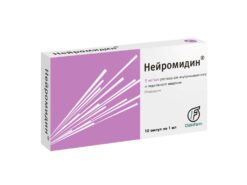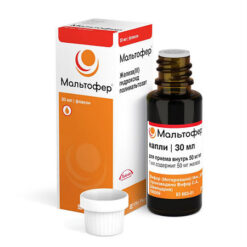-
×


-
×


Subtotal: €49.24




Subtotal: €49.24




Subtotal: €49.24
€1.00
Out of stock
(E-mail when Stock is available)
Erythropoietin is a glycoprotein that stimulates erythropoiesis, activates mitosis and maturation of erythrocytes from erythrocyte progenitor cells.
The molecular weight of erythropoietin is about 32,000-40,000 daltons. The protein fraction is about 58% of the molecular weight and includes 165 amino acids. Four hydrocarbon chains are linked to the protein by three N-glycoside bonds and one O-glycoside bond. Epoetin alpha, produced using genetically engineered technology, is a purified glycoprotein and is identical in amino acid and carbohydrate composition to human erythropoietin excreted from the urine of anemic patients.
Binocrit® has the highest possible degree of purification according to current technological capabilities. In particular, in quantitative analysis of the active ingredient of Binocrit® even trace amounts of cell lines are not detected.
The biological activity of epoetin alfa was confirmed in an in vivo experiment (studies were performed on healthy rats and rats with anemia as well as on mice with polycythemia). After epoetin alfa administration the number of erythrocytes, reticulocytes, hemoglobin concentration and 59Fe absorption rate increase.
In in vitro studies, incubation with epoetin alfa revealed increased incorporation of 3H-thymidine into erythroid nucleated cells of the spleen (in mouse spleen cell culture). Studies on human bone marrow cell culture showed that epoetin alfa specifically stimulates erythropoiesis and has no effect on leukopoiesis. Cytotoxic effects of erythropoietin on human bone marrow cells were not revealed.
Erythropoietin is a growth factor that mainly stimulates the formation of red blood cells. Receptors for erythropoietin can be present on the surface of various tumor cells.
The administration of epoetin alfa is accompanied by an increase in hemoglobin, hematocrit, serum iron, contributes to improved blood supply to tissues and heart function. The most significant effect of epoetin alfa is observed in anemia caused by chronic renal insufficiency and also developed in patients with a number of malignant tumors and systemic diseases.
Pharmacokinetics
Injection
The T1/2 of epoetin alfa after repeated IV administration is about 4 h in healthy volunteers and about 5 h in patients with chronic renal failure. In children the T1/2 of epoetin alfa is about 6 h.
P/K administration
The plasma concentration of epoetin alfa is significantly lower when administered p/k than when administered intravenously; the time to reach Cmax of epoetin alfa in plasma is about 12-18 h after administration. Cmax of epoetin alfa when administered by injection is only 1/20th of the concentration when administered intravenously.
The drug has no ability to cumulate – plasma concentration of epoetin alfa 24 hours after the first injection is the same as 24 hours after the last injection.
When administered by injection the T1/2 of epoetin alfa is difficult to determine, it is about 24 hours. The bioavailability of epoetin alfa when administered by mouth is significantly lower than when administered by IV and is estimated to be about 20%.
– anemia in adults and children caused by chronic renal failure (CRF), incl. anemia due to chronic renal failure in children and adults on hemodialysis, as well as in adults on peritoneal dialysis; severe anemia of renal origin, accompanied by clinical symptoms in adults with renal failure who have not yet undergone hemodialysis;
– treatment of anemia and reduction of the need for blood transfusions in adults receiving treatment with chemotherapy drugs for solid tumors, malignant lymphoma or multiple myeloma, as well as in people at high risk of complications of blood transfusions due to a general serious condition (in connection with cardiovascular diseases, if anemia was noted before the start of chemotherapy);
– to improve the efficiency of autologous blood transfusion as part of a pre-deposit blood collection program before surgery in patients with a hematocrit level of 33-39%, to facilitate the collection of autologous blood and to reduce the risk associated with the use of allogeneic blood transfusions if the expected need for transfused blood exceeds the amount that can be obtained by autologous collection without the use of epoetin alfa. Treatment is indicated for patients with moderately severe anemia (with a hemoglobin concentration of 10-13 g/dL or 6.2-8.1 mmol/L), without iron deficiency, if significant blood loss is expected, as well as during extensive surgical interventions, when a large volume of blood transfusion may be required (5 or more volumes in men and 4 or more in women);
– to reduce the degree of risk during allogeneic blood transfusion in adults who do not have iron deficiency, before elective orthopedic surgery, in the presence of a high risk of complications during blood transfusions. The use of the drug is limited – only in patients with moderate anemia (for example, with a hemoglobin concentration of 10-13 g/dL), if they are not included in the autologous blood collection program before surgery with an expected blood loss of 900 to 1800 ml;
– anemia in HIV-infected patients receiving zidovudine therapy with endogenous erythropoietin levels less than 500 IU/ml.
Erythropoietin is a glycoprotein that stimulates erythropoiesis, activates mitosis and maturation of red blood cells from erythrocyte progenitor cells.
The molecular weight of erythropoietin is about 32,000-40,000 daltons. The protein fraction makes up about 58% of the molecular weight and includes 165 amino acids. The four hydrocarbon chains are linked to the protein by three N-glycosidic bonds and one O-glycosidic bond. Epoetin alfa, produced using genetic engineering technology, is a purified glycoprotein; in amino acid and carbohydrate composition it is identical to human erythropoietin, isolated from the urine of patients with anemia.
Binocrit® has the highest degree of purification in accordance with modern technological capabilities. In particular, when quantitatively analyzing the active substance of the drug Binocrit®, even trace amounts of the cell lines on which the drug is produced are not determined.
The biological activity of epoetin alfa was confirmed in an in vivo experiment (studies were carried out on healthy rats and rats with anemia, as well as on mice with polycythemia). After administration of epoetin alfa, the number of red blood cells, reticulocytes, hemoglobin concentration and the rate of 59Fe absorption increase.
In vitro studies with incubation with epoetin alfa revealed an increase in the incorporation of 3H-thymidine into erythroid nucleated spleen cells (in cultured mouse spleen cells). Studies on human bone marrow cell cultures have shown that epoetin alfa specifically stimulates erythropoiesis and has no effect on leukopoiesis. No cytotoxic effects of erythropoietin on human bone marrow cells have been detected.
Erythropoietin is a growth factor that primarily stimulates the formation of red blood cells. Erythropoietin receptors may be present on the surface of various tumor cells.
The administration of epoetin alfa is accompanied by an increase in hemoglobin, hematocrit, serum iron, and improves blood supply to tissues and heart function. The most significant effect of epoetin alfa was observed in anemia caused by chronic renal failure, as well as in patients with a number of malignant neoplasms and systemic diseases.
Pharmacokinetics
IV administration
T1/2 of epoetin alfa after repeated intravenous administration is about 4 hours in healthy volunteers and about 5 hours in patients with chronic renal failure. In children, T1/2 of epoetin alfa is about 6 hours.
SC introduction
With subcutaneous administration, the concentration of epoetin alfa in the blood plasma is determined to be significantly lower than with intravenous administration; the time to reach Cmax of epoetin alfa in the blood plasma is about 12-18 hours after administration. Cmax of epoetin alfa with subcutaneous administration is only 1/20 of the concentration with intravenous administration.
The drug does not have the ability to accumulate – the concentration of epoetin alfa in the blood plasma 24 hours after the first injection is determined to be the same as 24 hours after the last injection.
With subcutaneous administration, T1/2 of epoetin alfa is difficult to determine; it is about 24 hours. The bioavailability of epoetin alfa with subcutaneous administration is significantly lower than with its intravenous administration, and is estimated at about 20%.
Epoetin alfa
At 2–8 °C (do not freeze).
2 years.
IDT Biology GmbH, Germany
| Shelf life | 2 years. |
|---|---|
| Conditions of storage | At 2-8 °C (do not freeze). |
| Manufacturer | I.D.T. Biology GmbH, Germany |
| Medication form | solution |
| Brand | I.D.T. Biology GmbH |
Buy Binocrit, 2000 me/ml 1 ml syringes 6 pcs with delivery to USA, UK, Europe and over 120 other countries.